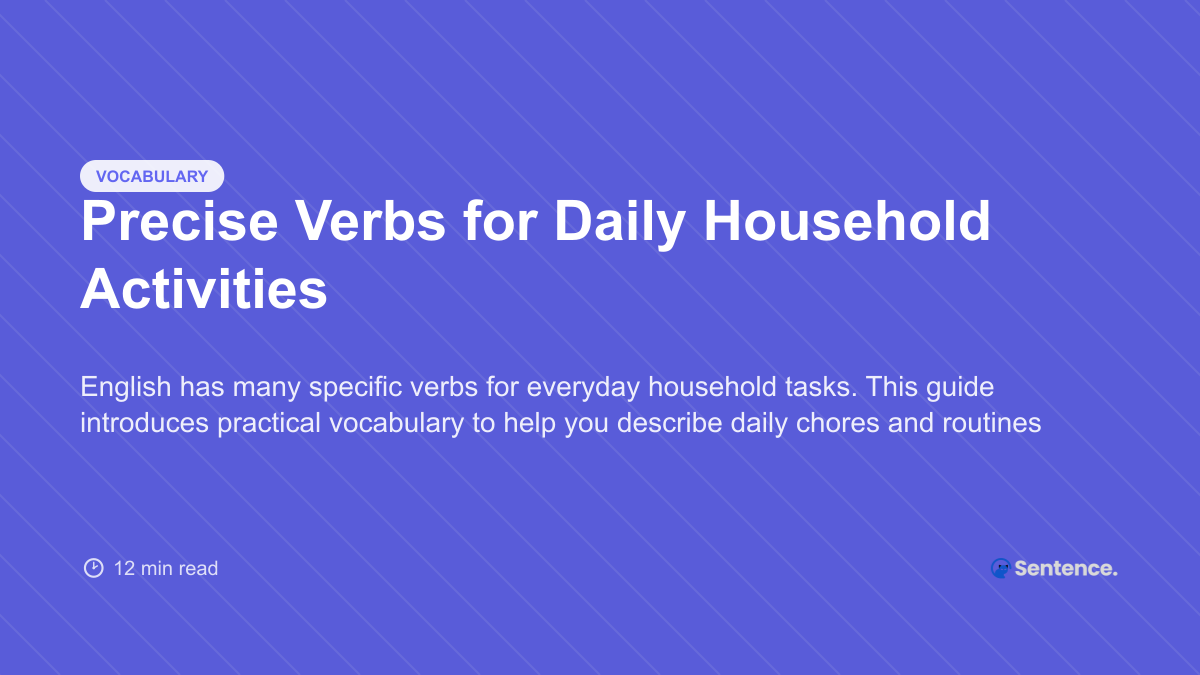
Precise Verbs for Daily Household Activities
English has many specific verbs for everyday household tasks. This guide introduces practical vocabulary to help you describe daily chores and routines clearly and naturally.

English has many specific verbs for everyday household tasks. This guide introduces practical vocabulary to help you describe daily chores and routines clearly and naturally.
Household activities are part of everyday life, yet many learners use only basic verbs like “do,” “clean,” or “make.” English actually has precise verbs for different chores and routines, helping you describe tasks more accurately. Using these verbs makes your English sound more natural and expressive.
This article introduces useful verbs for common household actions. They are grouped by activity type, with meanings and examples to help you use them confidently in daily conversations or writing.
Cleaning activities are often described using a single verb like “clean,” but English has many more specific verbs for different actions. These words help you describe how you remove dirt, dust, or mess from particular surfaces or objects.
| Verb | Meaning | Example |
|---|---|---|
| wipe | to clean a surface using cloth or tissue | Please wipe the table after eating. |
| sweep | to clean the floor using a broom | I need to sweep the kitchen floor. |
| dust | to remove dust from surfaces | She dusted the shelves this morning. |
| scrub | to clean something hard using pressure | He scrubbed the bathroom tiles. |
These verbs help you describe cleaning tasks more precisely, especially when talking about different surfaces or types of dirt.
Cooking involves many small actions, and English has verbs for nearly all of them. Using these verbs helps you describe recipes, cooking steps, or kitchen routines more clearly.
| Verb | Meaning | Example |
|---|---|---|
| chop | to cut into small pieces | She chopped the onions for dinner. |
| boil | to heat liquid until bubbles form | He boiled water for pasta. |
| fry | to cook in hot oil | They fried the chicken until crispy. |
| stir | to mix something by moving a spoon around | Keep stirring the soup to avoid burning. |
These verbs are essential in recipes, food tutorials, and everyday cooking conversations because they show exactly how food is prepared.
Many household tasks involve clothes—washing them, drying them, and preparing them for use. English uses specific verbs that make these tasks easier to describe in detail.
| Verb | Meaning | Example |
|---|---|---|
| wash | to clean clothes with water and soap | I need to wash my shirts today. |
| fold | to arrange clothes neatly | She folded the laundry after drying it. |
| hang | to place clothes on a line or hanger | He hung the clothes outside to dry. |
| iron | to remove wrinkles using heat | She ironed her uniform for school. |
These verbs describe common laundry steps and help you talk about clothing care clearly and naturally.
Keeping a home organized involves many small actions that English expresses with specific verbs. These words are useful when describing routines, instructions, or everyday responsibilities.
| Verb | Meaning | Example |
|---|---|---|
| arrange | to put things in a neat order | She arranged the books on the shelf. |
| organize | to group items logically or neatly | I need to organize my desk today. |
| replace | to put something back or change it with a new one | Please replace the batteries in the remote. |
| store | to keep something in a safe place | We store winter clothes in the closet upstairs. |
These verbs help you describe how you manage spaces, objects, and household routines with more detail and clarity.
Household verbs become easier to remember when you connect them to your daily routine. Think about the last time you swept the floor, folded clothes, or chopped vegetables. Linking each verb to a real action helps you master the vocabulary quickly and use it naturally in conversations.
Memory Tip:
Use specific verbs—wipe, sweep, fold—instead of repeating “do” for all household tasks.
Answers: chopped / fold / wiped / sweep
⭐ Pro Tip: Using precise verbs makes your English clearer and helps you sound more natural when talking about home routines.
English offers many precise verbs for describing daily household activities. Whether you’re cooking, cleaning, organizing, or doing laundry, the right verb helps you express the action clearly. With regular practice, these household verbs will become a natural part of your everyday English.